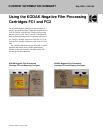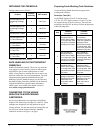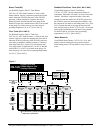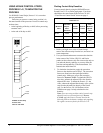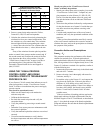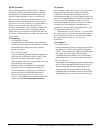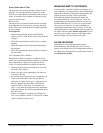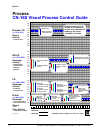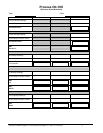
Using the KODAK Negative Film Processing Cartridges FC1 and FC2 • CIS-254 5
Additional Process CN-16S
Adjustment Factors for Use with
Process C-41 Control Strips
Step R G B
Yellow 0.00 0.00 0.00
D-max 0.00 0.00 +0.07
HD +0.04 0.00 +0.07
LD 0.00 0.00 0.00
D-min 0.00 0.00 0.00
4. Process a control strip and measure the Yellow,
D-max
b
-Y
b,
HD, LD, and D-min patches.
5. Calculate the variations from aim by subtracting the
aim densities from your control-strip densities. Plot
the variations on your control chart. Plot variations
that are higher than the corresponding aim values
(+ values) above the aim line. Plot variations that are
lower than the aim values (– values) below the aim
line.
If any of the variations from aim plots beyond the
action or control limits, process another control strip. If
the second control strip confirms the results of the first
strip, determine the cause of the problem. Using the
“Visual Process Control Guide” on page 8 provides a
good starting place. If the problem is not readily
correctable, contact Kodak Service and Support at
(866) 352-4367.
USING THE “VISUAL PROCESS
CONTROL GUIDE” AND KODAK
CONTROL STRIPS TO TROUBLESHOOT
PROCESS CN-16S
If your Process CN-16S control chart indicates an out-of-
control plot position, use the “Visual Process Control
Guide” as follows to troubleshoot the process and apply
corrective action.
First check for operational errors:
• Make sure the control-strip code matches the
reference-strip code.
• Calibrate the densitometer.
• Re-check the control-strip aims and verify the
correction factors.
• Verify the problem by processing a second control
strip.
• Determine if any recent processor maintenance could
have caused a problem.
• Verify that tank and replenisher solutions were mixed
correctly.
• Use an accurate thermometer to verify that the
developer temperature and other solution temperatures
are correct.
Match your plots to the “Visual Process Control
Guide” to identify the problem:
• Match your control plots to the examples given on the
“Visual Process Control Guide.” Compare only one
plot parameter at a time (D-max
b
-Y
b
, HD-LD, LD,
D-min). Note that the pattern of the red, green, and
blue plot deviations can be an indicator of different
problems.
• Write down the problems indicated by each parameter
for the plots that are out of control. Consider that you
may have more than one problem occurring at the
same time.
• Consider each potential cause of the out-of-control
condition, and verify the operational conditions of the
processor.
When you have determined the most likely cause(s)
of the out-of-control condition, take corrective action to
eliminate the cause, and use the prescriptions to eliminate
the symptom of the problem.
Corrective Action and Prescriptions
D-max
b
– Y
b
:
This parameter monitors the performance of the bleach
solution for retained silver. A bleach solution that is
underreplenished or diluted will not efficiently bleach the
film, leaving retained silver in higher-density areas. If the
D-max
b
-Y
b
indicates a retained-silver problem, confirm it
with the following test:
1. Immerse the processed control strip in the bleach tank,
and soak it for 7 minutes.
2. Remove the strip, rinse it thoroughly with water for
3 minutes, and dry it.
3. Re-read the strip, re-plot D-max
b
-Y
b
, and compare the
new plot to the earlier plot. If the new plot shows a
difference of -0.05 density unit or more (lower), it
confirms a bleaching problem. If there is no change or
less than a 0.05 change, the bleach is not a problem.
See the “Visual Process Control Guide” for other
possible causes.
If the test confirms a bleaching problem, replace the
bleach tank solution with fresh solution made from the
KODAK Negative Film FC Tank Bleach, as described on
page 3. Also check the output of the bleach replenisher
pump and calibrate. Be sure that the bleach replenishment
rate is set correctly.



